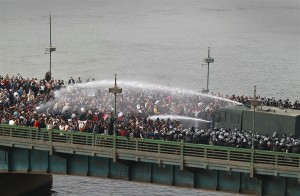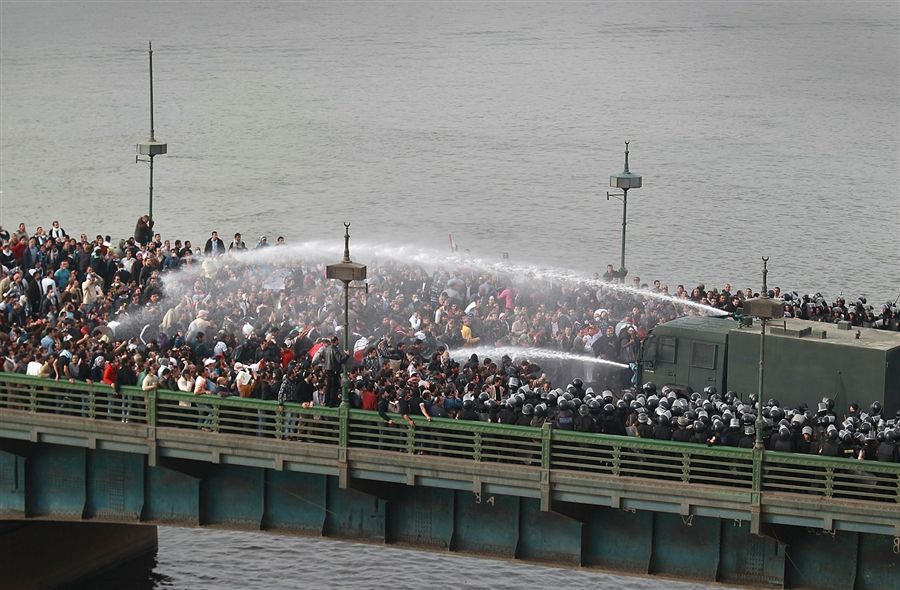
(AFP File Photo / Peter Macdiarmid)
As each anniversary of the 25 January Revolution approaches, popular demands seem to accumulate. Apart the basic hopes of 2011 for bread, freedom, dignity, and social justice, each new year seems to add up to the frustrations of the people who took to Tahrir four years ago.
Since the revolution, people have not seen any concrete progress, believes Yousry Al-Azabawy, a political expert at Al-Ahram Center for Political and Strategic Studies.
Looking back at the top demands of 2011, the most chanted slogan – “The people demand the fall of the regime” – was a direct call for Hosni Mubarak and his government to resign. Mubarak was forced to step down on 11 February 2011, but people wanted further legal pursuit.
Thus the demands came to include holding Mubarak and his regime accountable for corruption, the killing of protesters during the 18-day revolution, and embezzlement of public funds. The numbers of deaths reported from 25 January to 11 February was 1,075 in 22 governorates, according to the unofficial statistics database Wiki Thawra.
In response to those demands, when the Supreme Council for Armed Forces (SCAF) took power, a fact-finding committee to investigate the incidents of 25 January was installed. It issued its reports in April 2011, estimating the death toll at 840. The report confirmed excessive use of force by the police, as well as the use of live ammunition at protesters.
“The way the shooting occurred suggests policemen were following strict orders that cannot be contested and can only be issued from the minister of interior in person,” the report stated.
The committee also described Mubarak’s regime as a tyranny, and condemned its attempt to make Gamal Mubarak ‘inherit the throne’, in addition to accusations of elections’ fraud.
The same month, the Mubarak family was taken into custody, and investigations and persecution began. From February 2011 until June 2012, the SCAF held political power. Some major incidents occurred in that period, including the Mohamed Mahmoud clashes, the cabinet clashes, the Maspero protests ‘massacre’, an attack on the Israeli embassy, and so on.
Wiki Thawra recorded 438 martyrs during the period of SCAF rule. Practices of the regime pushed people into the streets again, and the first anniversary of the revolution was marked by demands of retribution for the martyrs, the end of the military regime, and the removal of former Field Marshall Mohamed Tantawi.
Presidential elections came next and Mohamed Morsi became president in June 2012. Morsi formed a second fact-finding committee and the first scenario was repeated. A few months after his rule, people demanded Morsi to step down and staged protests against the Muslim Brotherhood, demanding they be held responsible for several violent incidents such as the Itihadiya palace protests killing in December 2012. Wiki Thawra reported 470 deaths under Morsi.
Then again after 30 June 2013, a fact-finding committee was supposed to investigate the violent dispersal of the Rabaa sit-in and related incidents, but local human rights organisations criticised the committee’s final report.
Four years later, Mubarak, former interior minister Habib Al-Adly, and top security aides have been acquitted, after the judge presiding over the case decided to drop all charges against them on 29 November. Mubarak was still facing trial in the presidential palaces corruption case, but was cleared in that case as well. While he lies at the military hospital, his sons Gamal and Alaa are to actually walk free on Sunday, the same day as the revolution’s anniversary.
Meanwhile, the number and scale of street protests has been subdued by a harsh security crackdown, as thousands of political detainees remain behind bars for violating the Protest Law. The number of deaths since 30 June is estimated by Wiki Thawra to have exceeded all the previous tolls, with a number as high as 3,248.
This year, the 6 April Youth Movement will raise the slogans of retribution for the “martyrs” of the revolution, the end of the military rule, and the release of prisoners of conscience. Young activists are further frustrated by the outcomes four years later, mainly by the verdict of Hosni Mubarak and his regime aides.
Throughout the four year following the revolution, a social division often accompanied mass protests. In 2011, pro-Mubarak protesters faced the people at the Tahrir Square. In 2012, Brotherhood members stood against anti-regime activists. In 2013, pro-military groups protested against activists and the Brotherhood, in favour of Abdel Fattah Al-Sisi.
“This is what happens when you stop halfway. This is what happened to us. We switched attention from our main goal and started fighting on how to divide power,” said Fathy Afify, a former 6 April member and activist who participated in the revolution.
As for the people, nobody can blame them, added Afify. “It is only natural that they turn back to military rule, after they have seen the revolution fail.”



